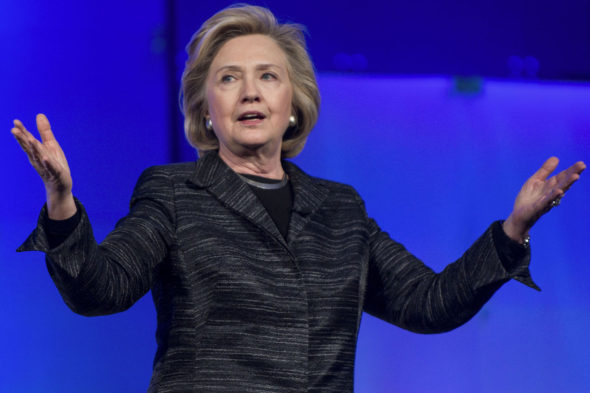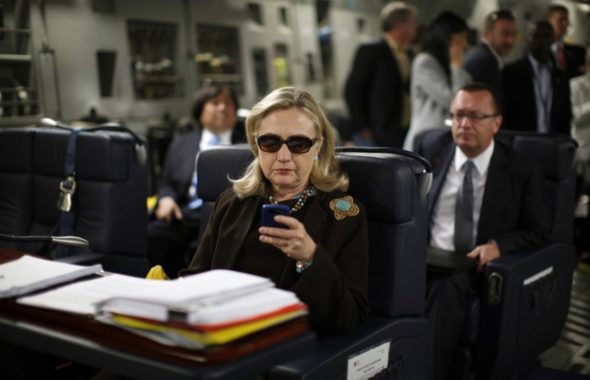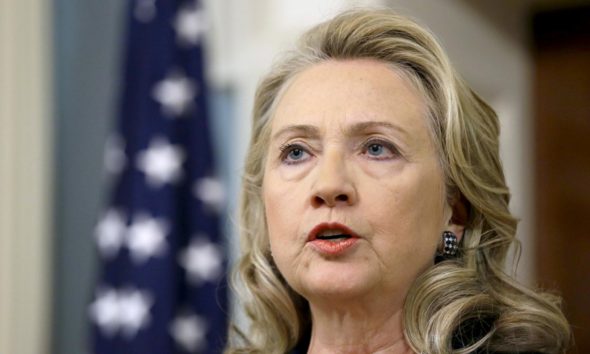Hillary Clinton Used Personal Email Account at State Dept.
Daily News Article — Posted on March 5, 2015

Former Secretary of State Hillary Clinton
(by Michael S. Schmidt, The New York Times) WASHINGTON — Hillary Rodham Clinton exclusively used a personal email account to conduct government business as secretary of state, State Department officials said, and may have violated federal requirements that officials’ correspondence be retained as part of the agency’s record.
Mrs. Clinton did not have a government email address during her four-year tenure as Secretary of State (from 2009-2013). Her aides took no actions to have her personal emails preserved on department servers at the time, as required by the Federal Records Act. [Mrs. Clinton was Secretary of State when terrorists attacked the U.S. embassy in Benghazi and murdered the Ambassador and several U.S. security men.]
It was only two months ago, in response to a new State Department effort to comply with federal record-keeping practices, that Mrs. Clinton’s advisers reviewed tens of thousands of pages of her personal emails and decided which ones to turn over to the State Department. All told, 55,000 pages of emails were given to the department. Mrs. Clinton stepped down from the secretary’s post in early 2013.

In this Oct. 18, 2011, file photo, then-Secretary of State Hillary Rodham Clinton checks her Blackberry from a desk inside a C-17 military plane upon her departure from Malta, in the Mediterranean Sea, bound for Tripoli, Libya. (AP)
Her expansive use of the private account was alarming to current and former National Archives and Records Administration officials and government watchdogs, who called it a serious breach.
“It is very difficult to conceive of a scenario – short of nuclear winter – where an agency would be justified in allowing its cabinet-level head officer to solely use a private email communications channel for the conduct of government business,” said Jason R. Baron, a lawyer at Drinker Biddle & Reath who is a former director of litigation at the National Archives and Records Administration.
A spokesman for Mrs. Clinton, Nick Merrill, defended her use of the personal email account and said she has been complying with the “letter and spirit of the rules.”
Under federal law, however, letters and emails written and received by federal officials, such as the secretary of state, are considered government records and are supposed to be retained so that congressional committees, historians and members of the news media can find them. There are exceptions to the law for certain classified and sensitive materials.
Mrs. Clinton is not the first government official – or first secretary of state – to use a personal email account on which to conduct official business. But her exclusive use of her private email, for all of her work, appears unusual, Mr. Baron said. The use of private email accounts is supposed to be limited to emergencies, experts said, such as when an agency’s computer server is not working.
“I can recall no instance in my time at the National Archives when a high-ranking official at an executive branch agency solely used a personal email account for the transaction of government business,” said Mr. Baron, who worked at the agency from 2000 to 2013.
Regulations from the National Archives and Records Administration (NARA) at the time required that any emails sent or received from personal accounts be preserved as part of the agency’s records.
But Mrs. Clinton and her aides failed to do so.
How many emails were in Mrs. Clinton’s account is not clear, and neither is the process her advisers used to determine which ones related to her work at the State Department before turning them over.
“It’s a shame it didn’t take place automatically when she was secretary of state as it should have,” said Thomas S. Blanton, the director of the National Security Archive, a group based at George Washington University that advocates government transparency. …
Mr. Blanton said high-level officials should operate as President Obama does, emailing from a secure government account, with every record preserved for historical purposes. “Personal emails are not secure,” he said. “Senior officials should not be using them.”

Hillary Clinton speaks at the State Department in Washington in 2012. Photograph: Alex Brandon/AP
Penalties for not complying with federal record-keeping requirements are rare, because the National Archives has few enforcement abilities.
Mr. Merrill, the spokesman for Mrs. Clinton, declined to detail why she had chosen to conduct State Department business from her personal account. He said that because Mrs. Clinton had been sending emails to other State Department officials at their government accounts, she had “every expectation they would be retained.” He did not address emails that Mrs. Clinton may have sent to foreign leaders, people in the private sector or government officials outside the State Department.
The revelation about the private email account echoes longstanding criticisms directed at both the former secretary and her husband, former President Bill Clinton, for a lack of transparency and inclination toward secrecy. …
It is not clear whether Mrs. Clinton’s private email account included encryption or other security measures, given the sensitivity of her diplomatic activity.
Mrs. Clinton’s successor, Secretary of State John Kerry, has used a government email account since taking over the role, and his correspondence is being preserved contemporaneously as part of State Department records, according to his aides. …
The existence of Mrs. Clinton’s personal email account was discovered by a House committee investigating the attack on the American Consulate in Benghazi as it sought correspondence between Mrs. Clinton and her aides about the attack.
Two weeks ago, the State Department, after reviewing Mrs. Clinton’s emails, provided the committee with about 300 emails — amounting to roughly 900 pages — about the Benghazi attacks.
Mrs. Clinton and the committee declined to comment on the contents of the emails or whether they will be made public.
The State Department, Ms. Psaki said, “has been proactively and consistently engaged in responding to the committee’s many requests in a timely manner, providing more than 40,000 pages of documents, scheduling more than 20 transcribed interviews and participating in several briefings and each of the committee’s hearings.”
Reprinted here for educational purposes only. May not be reproduced on other websites without permission from The New York Tmes. Visit the website at nytimes .com.
NOTE: The Washington Post reported that when asked, “White House Press Secretary Josh Earnest said Wednesday that he does not know if the White House knew that former Secretary of State Hillary Clinton had a private email server, or whether taxpayers funded it.”
Questions
1. The first paragraph of a news article should answer the questions who, what, where and when. List the who, what, where and when of this news item. (NOTE: The remainder of a news article provides details on the why and/or how.)
2. a) What law requires federal government officials to save all emails they send or receive on department servers?
b) Why does federal law require all correspondence written and received by federal officials to be saved?
3. a) When requested by the State Department to turn over Secretary of State Clinton’s emails, who decided which were important and should be given to her former department? How did they determine which emails should be given to the State Department?
b) Do you think all of Mrs. Clinton’s emails should have been turned over? Explain your answer.
c) Why did the State Department ask for these emails only now, two years after Mrs. Clinton left office?
4. a) Who was alarmed by Mrs. Clinton’s expansive use of a private (non-State Department) email account?
b) Why were they concerned?
5. a) How did Nick Merrill, a spokesman for Mrs. Clinton, explain her belief that her emails would be saved and accessible for the Archives?
b) List the people Secretary Clinton probably communicated with whose emails could not have been saved by the records department in this manner.
6. a) Mrs. Clinton’s use of personal email, run from a private server in her own home, was highly unusual. Her advisers will not say why she chose to conduct State Department business in this manner. Do you think as the top cabinet official in the Obama administration for three years she should explain her reason for this irregular action? Explain your answer.
b) Should news organizations like the NY Times or Associated Press make greater attempts to find out the answer, or leave her alone? Explain your answer.
7. Hillary Clinton is expected to be the Democratic presidential candidate in the 2016 election. Many Republicans, who don’t support her, are concerned over these revelations. Some Democrats are making excuses for her secrecy. Should voters of both parties be equally concerned if any federal government officials, either Republican or Democrat, ignore the law and use a personal internet server to hide their correspondence? Explain your answer.
8. The Associated Press reported (at apnews.com):
The computer server that transmitted and received Hillary Rodham Clinton's emails - on a private account she used exclusively for official business when she was secretary of state - traced back to an Internet service registered to her family's home in Chappaqua, New York, according to Internet records reviewed by The Associated Press.
The highly unusual practice of a Cabinet-level official physically running her own email would have given Clinton, the presumptive Democratic presidential candidate, impressive control over limiting access to her message archives. It also would distinguish Clinton's secretive email practices as far more sophisticated than some politicians, including Mitt Romney and Sarah Palin, who were caught conducting official business using free email services operated by Microsoft Corp. and Yahoo Inc.
Most Internet users rely on professional outside companies, such as Google Inc. or their own employers, for the behind-the-scenes complexities of managing their email communications. Government employees generally use servers run by federal agencies where they work.
In most cases, individuals who operate their own email servers are technical experts or users so concerned about issues of privacy and surveillance they take matters into their own hands. It was not immediately clear exactly where Clinton ran that computer system.
Clinton has not described her motivation for using a private email account - hdr22 @ clintonemail .com, which traced back to her own private email server registered under an apparent pseudonym - for official State Department business.
Operating her own server would have afforded Clinton additional legal opportunities to block government or private subpoenas in criminal, administrative or civil cases because her lawyers could object in court before being forced to turn over any emails. And since the Secret Service was guarding Clinton's home, an email server there would have been well protected from theft or a physical hacking.
It was unclear whom Clinton hired to set up or maintain her private email server, which the AP traced to a mysterious identity, Eric Hoteham. That name does not appear in public records databases, campaign contribution records or Internet background searches. Hoteham was listed as the customer at Clinton's $1.7 million home on Old House Lane in Chappaqua in records registering the Internet address for her email server since August 2010.
Also: Clinton used a personal email account during her time as secretary of state, rather than a government-issued email address, potentially hampering efforts to archive official government documents required by law. Clinton's office said nothing was illegal or improper about her use of the non-government account and that she believed her business emails to State Department and other .gov accounts would be archived in accordance with government rules.
a) Ken Thomas, a national political writer for the Associated Press, said regarding the revelations about former Secretary of State Clinton “It just gives Republicans fodder…that she’s trying to skirt the law and get around the normal ways of doing business.” Is she?
b) Do Mrs. Clinton’s actions indicate to you that she was trying to hide some of her activities or do you think it was for a different reason? What could have been her motive for not complying with the law? Explain your answer.
Background
The Federal Records Act
Under the Federal Records Act (law), "the head of each Federal agency shall make and preserve records containing adequate and proper documentation..." (from the U.S. National Archives archives.gov)
Under the Federal Records Act (law), each federal agency is required to make and preserve records that (1) document the organization, functions, policies, decisions, procedures, and essential transactions of the agency and (2) provide the information necessary to protect the legal and financial rights of the government and of persons directly affected by the agency’s activities.
The Act defines a federal record without respect to format.
Records include all books, papers, maps, photographs, machine-readable materials, or other documentary materials, regardless of physical form or characteristics - including email - made or received by an agency of the government under federal law or in connection with the transaction of public business and preserved or appropriate for preservation by that agency as evidence of the organization, functions, policies, decisions, procedures, operations, or other activities of the government or because of the informational value of data in them.
What is the The National Archives and Records Administration (NARA)? Go to: archives.gov/about
About the U.S. State Department:
The U.S. Department of State advises the President in the formulation and execution of foreign policy and promotes the long-range security and well-being of the U.S.. The Department determines and analyzes the facts relating to American overseas interests, makes recommendations on policy and future action, and takes the necessary steps to carry out established policy. …The Department … negotiates treaties and agreements with foreign nations; speaks for the U.S. in the United Nations and other international organizations in which the U.S. participates; and represents the U.S. at international conferences. (from about.com)
- The Department operates the diplomatic missions [embassies and consulates] of the U.S. abroad and is responsible for implementing our foreign policy and diplomacy efforts.
- The Department is led by the Secretary of State, who is nominated by the President and confirmed by the Senate and is a member of the Cabinet.
- The current Secretary of State is John Kerry. The Secretary of State is the first Cabinet official in the order of precedence and in the presidential line of succession. (from wikipedia)
The Freedom of Information Act (FOIA)
- The FOIA provides access to all federal agency records (or portions of those records) except those which are protected from release by nine specific exemptions (reasons an agency may withhold records from a requester).
- The exemptions cover such material as (1) classified national defense and foreign relations information, (2) internal agency personnel rules and practices, (3) material prohibited from disclosure by another law, (4) trade secrets and other confidential business information, (5) certain inter-agency or intra-agency communications, and others...
- The FOIA does not apply to Congress or the courts, nor does it apply to records of state or local governments. However, nearly all state governments have their own FOIA-type statutes....
- Under the FOIA, you may request and receive a copy of any record that is in an agency's official files and is not covered by one of the exemptions. (from epic.org/open_gov/rights.html)
